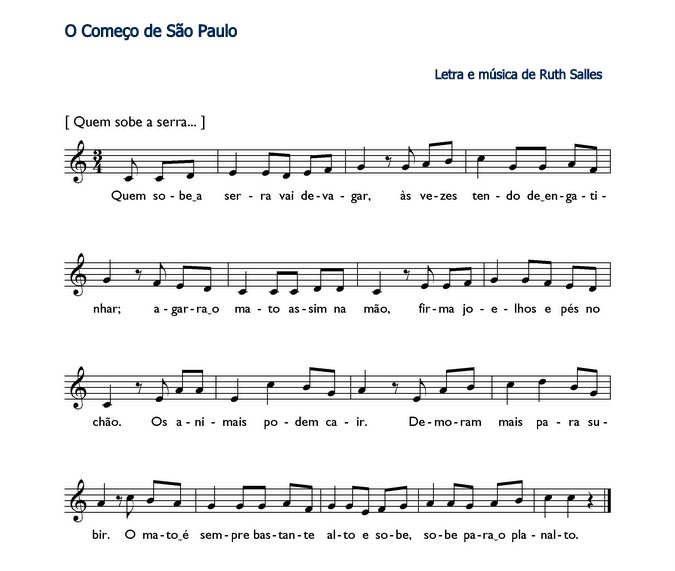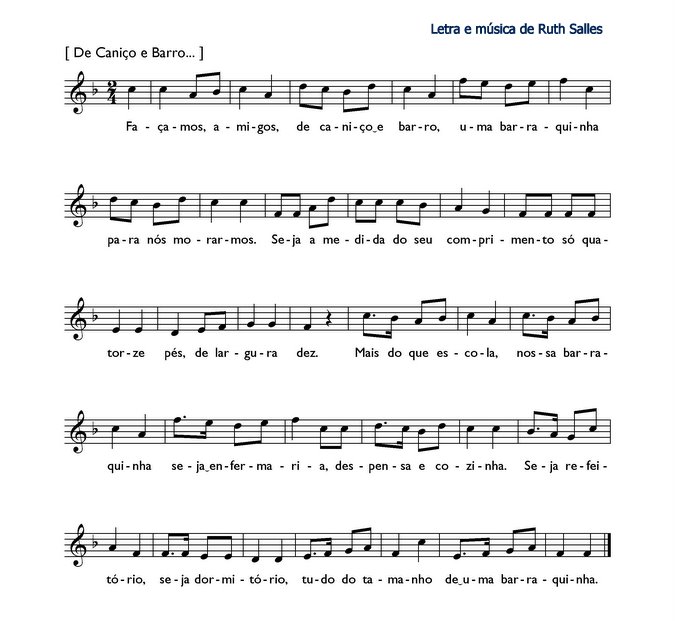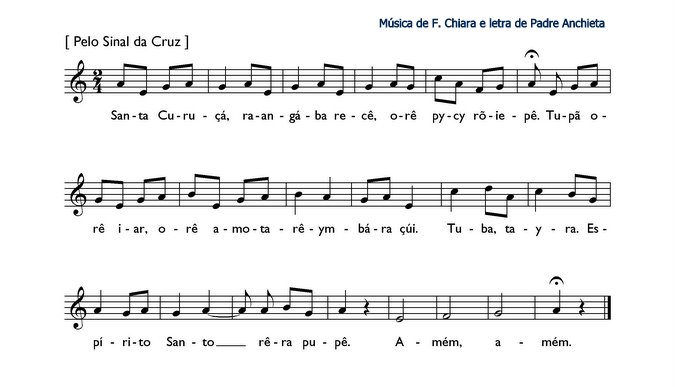Piece by Ruth Salles
This piece is based on correspondence exchanged between José de Anchieta¹ and Aspicuelta Navarro² as Ignacio de Loyola. It begins with Fathers Nunes and Manuel da Nóbrega going up from São Vicente to the plateau, guided by André, son of João Ramalho. It talks about the activity of each one and also of the indigenous people, ending with the foundation of São Paulo. At the end, the hymn “Pelo Sinal da Cruz” by F. de Chiara can be sung, with lyrics in Tupi by José de Anchieta.
Suggested for 10 year olds.
Characters:
Choir
indians
Father Manuel da Nóbrega, superior of the Jesuits
Father Leonardo Nunes, the first to climb the mountain.
João Ramalho, Head Guard of Campo de Piratininga.
André Ramalho, his son.
Bartira, wife of João Ramalho and daughter of Tibiriçá.
Tibiriçá and Caiubi, chiefs.
Father Manuel Chaves, who went to get torn sails from the caravels in São
Vicente, to make clothes.
Brother José de Anchieta, who learned to make shoes and was a poet and teacher.
Father Mateus Nogueira, who worked as a blacksmith.
Father Diogo Jácome, who worked as a cabinetmaker.
Father Aspicuelta Navarro, who quickly learned Tupi and wrote in that
language, since being of Basque origin, it found
similarities between the Basque language and Tupi, which
it also happened with Anchieta, grandson of Basques.
CHORUS (while Nóbrega and Nunes walk as if they were talking):
– Father Manuel da Nóbrega,
superior of the jesuits
who came to Brazil,
conversation with Father Nunes,
who was the first priest
leaving São Vicente
walking up the mountain
until you reach the plateau,
reaching the high field
from Piratininga.
Father Nobrega, old man,
want to go the same way.
Then comes young André, (André leaves the choir and bows before the two)
who is the son of João Ramalho
and guide them both in the shortcuts
of saw above.
PADRE NÓBREGA (walks with a staff):
– What is this mountain that never ends?
FATHER NUNES:
– Paranapiacaba.
FATHER NOBREGA:
'And is there good land up there on top of it?'
FATHER NUNES:
– Such a beautiful land…
It's called Campo de Piratininga,
where it always splashes
an early morning drizzle.
And in the dense grove,
many birds sing joyfully,
when they fly from their nests.
FATHER NOBREGA:
- Well, I want to climb the mountain too.
and come to this land.
There we can found a college,
to teach him.
Every child that arrives there,
we will educate.
(The three begin the ascent. They are inclined, to give the impression of the slope.)
CHORUS (sings as the three ascend; if the text is only spoken, the short length of the verses is to give the idea of the short breath and slow steps):
“Who climbs the mountain
go slow,
sometimes having
to crawl;
grab the weeds
so in hand,
firm knees
and feet on the ground.
The animals
can fall.
take longer
to go up.
the bush is always
quite high
and up, up
to the plateau.”
ANDRÉ RAMALHO (the three of them having arrived, he points to a man):
– Father Nunes, Father Nóbrega,
the man you see there
is my father waiting for you,
It's João Ramalho, Mr.
of the Tietê valley.
JOÃO RAMALHO (already detached from the Choir):
– I am Head Guard of the Field,
I know the ground where I stand.
I will help you gentlemen
in everything needed. (points to a woman who is also approaching)
Bartira, my wife,
take care of this floor.
BARTIRA:
– I prepared planted swiddens
that good fruits always bear.
JOÃO RAMALHO:
– Build your village
between the rivers that are there:
between Anhangabaú
and the Tamanduateí.
Two Indians with their tribes
will protect them there: (points to them)
chief Tibiriçá
and chief Caiubi.
(Other Jesuits on one side and other Indians on the other stand out from the Choir.)
PADRE NÓBREGA (as if speaking to the audience):
– Many, many are coming,
helping each other,
teaching, learning,
all together living together. (greeting Anchieta and Manuel Chaves):
– It's Brother José de Anchieta!
– Hello, Father Manuel Chaves!
FATHER MANUEL CHAVES:
- Hi! I brought these candles.
They are very torn candles
that the sailors give me.
With them everyone will have
good warm clothes.
INDIAN 1:
- If you want black clothes,
I take ink from the plant
I'll look for it in the woods.
INDIAN 2:
– From the caraguatá plant,
I will teach the whites
to make a good shoe.
BROTHER JOSÉ DE ANCHIETA:
- And I'll be the shoemaker.
I will also be a teacher. (addressing Aspicuelta Navarro)
And you, Aspicuelta?
FATHER ASPICUELTA NAVARRO:
– For the Indians of this land,
I will write in tupi
the story of Creation,
which is in the sacred text.
For with the language they speak
I'm used to it.
FATHER DIOGO JÁCOME:
– And you, Mateus Nogueira,
could be our blacksmith.
FATHER MATEUS NOGUEIRA (agreeing and patting the other on the back):
– Very willingly!
And then you, Diogo Jácome,
who knows how to carve wood,
do the rosary beads. (addressing Aspicuelta Navarro):
INDIAN 3:
- Let's bring food,
or the swidden or hunting.
FATHER MANUEL DA NÓBREGA:
- Well, let's make a school,
may it serve us as a home!
BROTHER JOSÉ DE ANCHIETA:
– In a small cabin
we will all fit.
In an even smaller place
Jesus Christ wanted to be born.
CHORUS (sings with everyone while the construction is simulated):
"Let's do it, friends,
of reeds and clay,
a little stall
for us to live.
be the measure
of its length
only fourteen feet;
wide, ten.
More than school
our stall
be infirmary,
pantry and kitchen.
be cafeteria,
be dormitory,
all the size
from a stall.”
CHORUS (speaks, with everyone):
– The bed is a hammock. The door is mat.
The table is banana leaf.
Our food is very abundant:
fish, cassava, corn and pumpkin,
deer or lizard meat.
FATHERS:
– And so this College was built…
JOÃO RAMALHO, ANDRÉ, BARTIRA:
– But what day was this?
FATHERS:
— On the day that Paul of Tarsus
he became an apostle of Christ.
INDIANS:
– And so to the College and to the village so beautiful
this name was given:
São Paulo from Campo de Piratininga!
CHORUS (while the mass is being prepared):
- Go Father Paiva
the mass pray.
It's Brother Anchieta
who will help.
The altar is made of rods,
the cross is simple.
In the middle of the woods,
what a beautiful mass!
ALL (sing):
“Santa Curuçá, raangaba recê,
orê pycy rõiepê. Tupa orê iar, orê
amotareymbára çuí. Tuba taýra.
Espírito Santo rêra pupê.
Amen, amen.”



 *1: ANCHIETA, José de. Correspondence with Ignacio de Loyola. São Paulo: Archives of the Mario de Andrade Library, date n/d.
*1: ANCHIETA, José de. Correspondence with Ignacio de Loyola. São Paulo: Archives of the Mario de Andrade Library, date n/d.
*2:NAVARRO, Aspicuelta. Correspondence with Ignacio de Loyola. São Paulo: Archives of the Mario de Andrade Library, date n/d.

 ***
***


